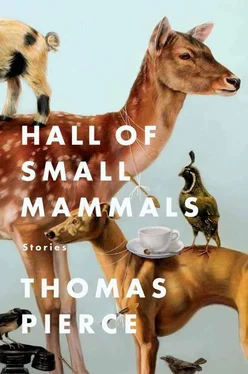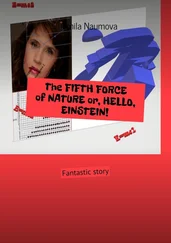• • •
They left the house a day early, before dawn, with fresh coffee in the thermos and turkey sandwiches in Ziploc bags. They had reservations at an inn in Colonial Williamsburg and arrived before check-in time. While Delia shopped, Bert strolled up and down the cobblestone streets, stopping to watch women in bonnets churn butter and make candles. That night Delia and Bert had dinner at a tavern and talked about their kids, about Pop-Yop — about anything but Rob.
The next morning they were up early again. The radio news station crackled and died in the tunnel under the Chesapeake, and when they emerged again on the bridge, the sky was a dazzling blue pocked with flapping gulls.
Bert switched off the radio so Delia could read the directions to the base. Once there, a man at the front gate checked a clipboard before waving them through, and then, as instructed, they parked in front of a beige brick building not far from the entrance.
“You ready for this?” Delia asked, pulling her purse over her shoulder.
Inside the building was a small waiting room with white plastic chairs and a low table full of magazines with old fashions. The uniformed man at the front desk scanned Bert’s and Delia’s driver’s licenses and passports and then printed them both sticker badges. He pointed them toward the empty chairs, saying it wouldn’t be more than fifteen minutes or so before departure.
“So,” Delia said, “when do we meet the mysterious Mrs. Oliver?”
“I don’t think she’s coming,” Bert said. “At least that was my impression.”
“Shame,” Delia said, digging a book out of her purse.
They had been in a helicopter once before together, many years ago on their honeymoon in Hawaii. The helicopter ride was an expensive excursion that had taken them over an active volcano. Rob had been thirteen years old at the time of the wedding, but, at the insistence of their mother, he’d acted as Bert’s best man, his cummerbund so loose that it smiled below his waist. “Please tell me you already tested the goods,” Rob had said before the ceremony with a dumb teenager’s grin, braces shiny and sharp. (His brother, the biological weapon.)
Armed men arrived to escort them to the landing pad. Together they hustled outside and crouched low to pass beneath the giant whooshing blades of the aircraft. Delia struggled to contain the swirling mess of her hair. The pilot, an older expressionless man with aviator sunglasses over his eyes, twisted around in his seat and gave them a thumbs-up. Bert helped Delia with her buckle before working on his own. They were both given headphones that clapped over their ears and muffled the noise. The helicopter was about to lift off when another woman came galloping toward the craft. She was wearing jeans, a T-shirt, and flat yellow shoes. Her hair was slick, short, and red.
“Sorry,” she shouted to no one in particular, then tried to smile at Bert and Delia. She was pretty but pretty like a model: flat-chested and vaguely androgynous. She strapped into a seat across from them. Soon they were in the air and headed for the coast, the city sliding away beneath them.
Their headphones crackled. “This won’t take too long,” a gravelly voice said. It was the pilot. Bert realized that they could talk to each other, thanks to the headset intercom system. The new passenger stared down at her cell phone and a wad of mascara-stained tissue. Presumably she was out here for the same reason, to say goodbye to someone, to another one of the infected victims. She looked up and caught Bert studying her.
“Kind of an odd way to meet, isn’t it?” she asked him.
Bert nodded.
“You don’t look much like him,” she said. “Just a little bit, around the mouth maybe. Chin, too.”
Bert didn’t say anything.
“I’m Cecilia,” she said.
“Have we met?” Delia asked.
“No, but I just assumed—” She looked at her hands, then back at Delia. “I guess it makes sense. You weren’t that close, were you?”
“Did he tell you that?” Bert asked. “That we weren’t close?”
Cecilia made a face like she might cry. She fidgeted in her seat. “No, sorry,” she said. “It was just my impression. What do I know, you know? I didn’t mean to—”
The helicopter banked left, and Bert felt his stomach drop. The sky was cloudless. Below he could see whitecaps spitting and foaming.
“Almost there,” the pilot said.
A long gray metal ship was coming into view. It was a tremendous boat, the size of a football field and stacked high with containers of all colors: blue, red, purple, orange. As the helicopter descended and spun around the ship, Bert spotted another, smaller boat, tethered to the container ship by bulky cables that dropped beneath the water. The big ship was towing the smaller one.
“That’s it,” the pilot said. “The little boat. That’s where the bodies are.”
“Bodies?” Cecilia asked. “As in, plural? As in, more than one?”
“That’s correct. I think we’re at five now.”
“Shit,” she said, appealing to Delia and Bert. “Fuck, can you believe any of this? It’s unreal.” She dabbed the corners of her eyes with the tissue. “I’m not sure if this trip was a good idea or not.”
“I’m sorry,” Delia said, “but I have to ask. Were you… with Rob?”
She nodded. “Off and on. Mostly on. Before he left for his last trip, on.”
The helicopter circled the smaller boat a few times.
“I don’t see any people on deck,” Delia said.
“They’re keeping the bodies isolated,” the pilot said. “No one living is allowed on board.”
Bert had a clear view down to the boat. He could see a metal ladder leading up to a small, empty captain’s deck. He could see a metal door with a crusty porthole. The sunlight glinted off the metal and the water with the same blinding sparkle that made it difficult to look down for very long without his eyes watering. The pilot advised them to say their goodbyes if they hadn’t already because they were about to head back to the base. In truth, Bert felt no closer to his brother’s death out here than he had back on land. But he needed to let go. His brother’s story would have to end here at sea in the belly of an unmanned boat. The helicopter pulled away from the ship and the water, and Cecilia craned her neck to keep sight of it. “That’s it?” she asked, frustrated. “What happens next?”
“Nothing,” the pilot said. “Nothing happens next.”
“I thought we’d get a little closer,” she said. “I don’t understand. It’s not like they can keep him out here forever.”
The pilot nodded. “This is only a temporary solution. Until they figure out a better one.”
Cecilia closed her eyes. “It’s almost like I can feel him,” she said. “It’s, like, this terrible feeling that he’s trapped out here.”
Delia reached for the woman’s hand, but the straps constrained her to the chair. Bert wondered if Cecilia really did feel Rob’s presence, if there was something closed inside of him that prevented him from feeling it too. He twisted for a final view of the two ships, memorizing all the details he could, the rust and corrosion and salt stains, the antennas, the arrangement of the containers. He was constructing a reliable image that he could refer to months from now, when this helicopter ride would no doubt begin to seem more like a dream than a memory.
“Goodbye, Rob,” Cecilia said, and tossed a piece of paper out the window.
“What was that?” Bert asked her.
Cecilia was looking out the window, watching the paper twirl and disappear. “I’ve met someone else.” She turned to them and grimaced. “Is that awful of me?”
“Well, it’s been half a year,” Delia said but didn’t say whether she thought that a long or short amount of time.
Читать дальше












